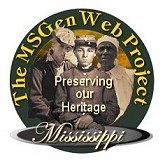
Pontotoc County, Mississippi
Genealogy and History
Peggy A. Young, County CoordinatorJeff Kemp - State Coordinator Denise Wells - Assistant State Coordinator
Ann Allen Geoghegan - Assistant State Coordinator
Thursday, 31-Oct-2024 19:08:01 CDT

W. P. A. History of Pontotoc County, Mississippi
CHAPTER 1 CONTINUED
Interviews
MARK WEATHERALL relates the following interesting story of his pioneer ancestors: "On the last trip Father Stuart made to Abbeville, South Carolina, from Mississippi, my grandfather, Dr. Marshall Weatherall, and Dr. J. A. Ware, gave his two mules and a negro to bring to his mission in Pontotoc County.
In the summer of 1832 Father Stuart put the negro on a mule and sent him back to Abbeville to tell my people of the attractions of this county and to urge that they come to it. They came in wagons, driven by mules and oxen, and brought with them their cows, sheep, goats, mules, and slaves. In the group were Dr. J. A. Ware, Dr. Marshall Weatherall, Samuel Watt, Mrs. Annie Herron, and Dr. Hanna. Watt had been Esquire in that district before he moved to Pontotoc County.
Dr. Ware, my maternal grandfather, was a Baptist minister and was pastor of the Toxish church for thirty years, and Dr. Weatherall, my paternal grandfather, was an Elder in the Monroe Church during his lifetime.
My uncle Sam Watt was a rich bachelor, and my father, who was then twelve years old, lived with him on a place three miles north of town. The land is now owned by Joe Edwards; my mother was born in 1836, within a mile of Toxish Church.
When grandmother Ware died, grandfather married a Miss Ware from Aberdeen. She was not related to the family. This second wife had two daughters, Addie and Anna. Parson A. J. Seale, who succeeded my grandfather as pastor at Toxish, married Addie. Anna never married, and was active in church work at Toxish as long as she lived. Dr. Gus Evans of Aberdeen is a nephew of my step-grandmother.
When my people came here there were no other settlers; Indians occupied the country. These pioneers had to pitch right in and clear the land; all supplies came from Aberdeen or Memphis, but everything of course was shipped out of New Orleans, up the Mississippi to Memphis, or the Tombigbee for Aberdeen.
When David Crockett came to this county as a horse trader he stayed at the home of my uncle, Sam Watt. When the news of the Texas Mexican War was brought by travelers down the Natchez Trace to the Indian Chief, James Colbert, he knew that Crocket was at my uncle's house, and rode over to tell him of the war. He arrived about 9 o'clock at night but was not offered a bed in the house so, as he would not sleep with the negroes, he put downs his blankets on the front gallery and slept there. Indians thought they were better than negroes and white men would not put themselves on equality with Indians, therefore the chieftain slept alone.
The next morning David Crocket got rid of all of his horses except the one he rode and left for Texas. You know what he did when he got there!
When I was a little boy my father used to show me a horse apple tree from which Crockett shot at sparrow hawk with his arrow the morning before he left for Texas. The tree has been dead for 50 years but the incident remains in my mind.
My father, Watt, and my uncle, John, were educated by their bachelor uncle, Sam Watt. They were placed on horses and accompanied by two negroes, were sent to Lebanon, Tennessee to school. After the Civil War my father, who married Hassletine Ware, went to his farm, three miles northwest of Pontotoc, where he lived until he died. He had two sisters; Emma, who married Robert Grisham, and Jane, who married Dr. Orr of near Shannon, another of the prominent families of the old county. There were four brothers: George, who married Virginia Threlkeld; Edward, who married Annie Mallory of near Shannon; Alex, who married Emily Coleman, daughter of Judge Coleman, who lived three miles northwest of Pontotoc; and John T. who married Lizzie Adams, whose father was a member of Congress and lived in Pontotoc."(1)
The family is of the aristocracy of the county. Their intermarriage with like blood in the state has carried on the traditions of a gentle people.
(1) Mark Weatherall, Pontotoc, Miss.
Back Contents Next